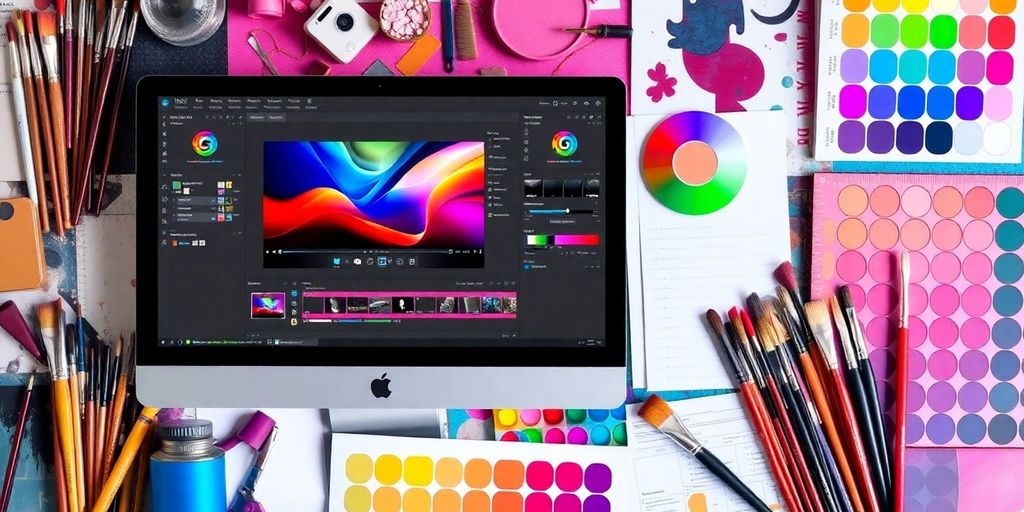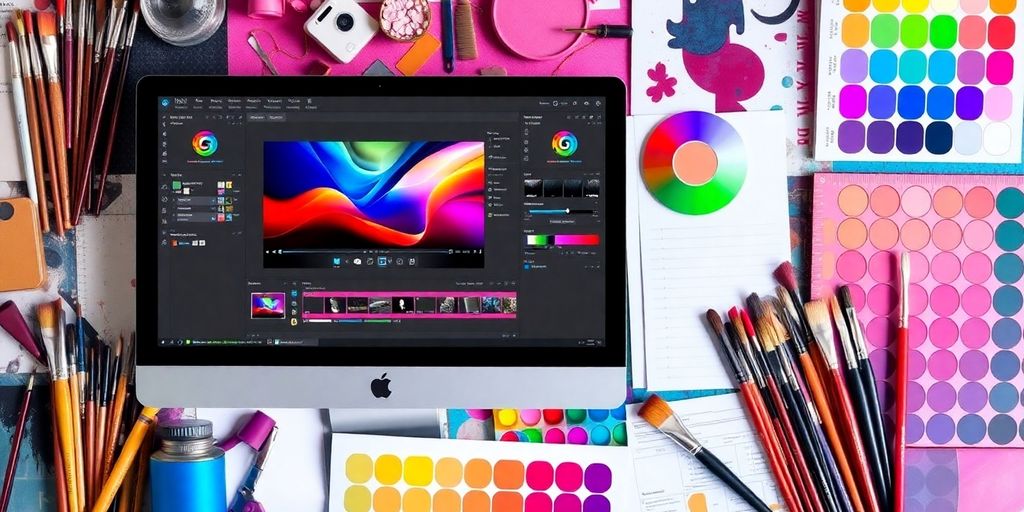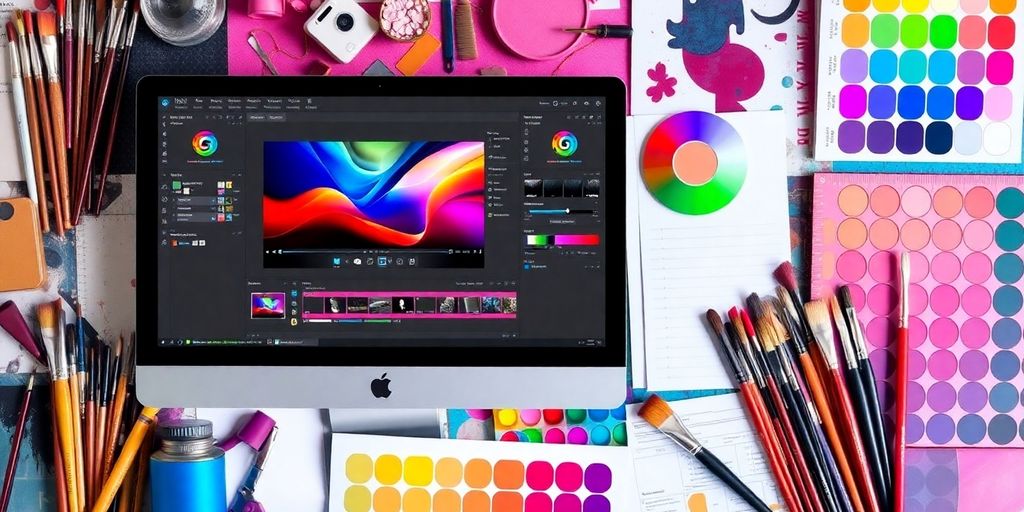Traditional Photography Classes Alternatives: Online Courses & Practice
If you’re looking to learn photography but traditional classes seem too rigid or expensive, online courses might be the perfect fit. They offer flexibility and a variety of topics, allowing you to learn at your own pace. Whether you’re just starting out or want to refine your skills, there are plenty of options available. In this article, we’ll explore different online photography classes, from beginner to advanced, and highlight some great resources for budding photographers.
Key Takeaways
- Online photography courses cater to all skill levels, from beginners to advanced.
- There are specialized classes focusing on various photography techniques and styles.
- Many accredited institutions offer trusted online photography certificate programs.
- Kids can also benefit from engaging online photography classes designed just for them.
- A variety of apps and podcasts are available to help photographers continue learning on the go.
Browse Online Photography Courses
Finding the perfect online photography course can feel like searching for a needle in a haystack. There are so many options out there, it’s easy to get overwhelmed. Whether you’re just starting out or looking to refine your skills, understanding how to navigate the available resources is key. Let’s break down some ways to make the process a little easier.
Finding the Right Course for You
The first step is to really think about what you want to get out of the course. Are you hoping to learn the basics of using a DSLR, or are you more interested in mastering a specific technique like portrait photography? Maybe you want to learn about photography equipment. Knowing your goals will help you narrow down your options and choose a course that aligns with your interests and skill level. Don’t be afraid to read course descriptions carefully and check out any available previews or sample lessons.
Filtering by Skill Level
Online photography courses cater to a wide range of skill levels, from absolute beginners to experienced photographers. Most platforms allow you to filter courses by difficulty, so you can easily find options that are appropriate for your current knowledge and experience. Look for courses that clearly state their target audience and prerequisites. If you’re new to photography, start with a beginner-level course that covers the fundamentals. If you already have some experience, you might want to jump into an intermediate or advanced course that focuses on more specialized topics.
Exploring Different Topics
The world of photography is vast and diverse, with countless topics to explore. From landscape and wildlife photography to portraiture and street photography, there’s something for everyone. Online courses offer a great way to delve into different genres and techniques, allowing you to expand your skills and discover new passions. Don’t be afraid to experiment with different topics and see what resonates with you. You might be surprised at what you discover!
I remember when I first started looking at online courses, I was totally lost. There were so many options, and I didn’t know where to begin. But once I took the time to really think about what I wanted to learn, it became much easier to find courses that were a good fit for me. Now I’m constantly learning new things and improving my skills, all thanks to online photography courses.
Types of Online Photography Classes Available
Online photography classes are all about helping you reach specific goals, whether they’re personal or professional. You can find courses that teach you how to fix red-eye in photos, or even how to start your own photography business. Some classes are for people who want to get a degree, while others are just for learning on your own.
Beginner to Advanced Options
No matter where you are on your photography journey, there’s a class for you. Beginner courses focus on the basics, like how to hold a camera and understand aperture. Advanced courses, on the other hand, might cover complex lighting setups or post-processing techniques. It’s all about finding the right fit for your current skill level.
Specialized Techniques
Want to learn how to take stunning portraits? Or maybe you’re interested in landscape photography? There are online classes that focus on specific techniques. These courses let you really hone in on the skills you need for the type of photography you love. You can find classes on:
- Black and white photography
- Food photography
- Wildlife photography
- Night photography
Specialized courses are great because they allow you to focus on a niche that interests you. This can make learning more engaging and help you develop a unique style.
Degree Programs vs. Independent Learning
You can even get a photography degree online these days! These programs offer online services a structured curriculum and can lead to career opportunities. But if you’re not looking for a degree, there are plenty of independent learning options available. These courses are often shorter and more flexible, allowing you to learn at your own pace.
Trusted Online Photography Certificate Programs
So, you’re thinking about getting a photography certificate online? That’s cool. It can be a good way to show you know your stuff. Let’s look at some options.
Accredited Institutions
When you’re looking at certificate programs, accreditation is something to consider. It basically means a school or program meets certain standards. It can affect how seriously employers take your certificate. Some well-known places include:
- New York Institute of Photography (NYIP): They’re online-only and have different courses. They even have a free camera course that people seem to like.
- Professional Photographers of America (PPA): This is a big non-profit with tons of free classes if you make an account.
- Alison: They provide diplomas in digital photography for free. It might take 10-12 hours to complete.
Course Content Overview
What will you actually learn? It depends on the course, of course! But expect things like:
- Basic camera settings (aperture, shutter speed, ISO).
- Composition techniques (rule of thirds, leading lines).
- Lighting (natural and artificial).
- Photo editing software (like Adobe Photoshop or Lightroom).
Getting a certificate can be a good way to learn new skills or prove you have skills. But it’s not the only way to get better at photography. Practice is super important too.
Benefits of Certification
Why bother getting a certificate? Here are a few reasons:
- It can help you stand out when you’re applying for jobs.
- It shows you’re serious about photography.
- You might learn things you wouldn’t have on your own.
- It can give you more confidence in your skills.
Digital Photography for Beginners Courses
If you’re just starting out, the world of digital photography can seem overwhelming. Luckily, there are tons of resources available to help you learn the ropes. Many of these courses are free, making it easier than ever to explore your interest without breaking the bank. Let’s take a look at some options to get you started.
Free Resources for New Photographers
There are many free resources available for new photographers. YouTube is a great place to start, with countless tutorials covering everything from basic camera settings to composition tips. Websites like Lifehacker also offer comprehensive guides that break down complex topics into easy-to-understand sections. Don’t underestimate the power of free content – it can provide a solid foundation for your photography journey. You can also find Ivy League Courses online.
Essential Skills to Learn
As a beginner, there are a few key skills you should focus on developing:
- Understanding your camera: Learn the basics of aperture, shutter speed, and ISO. These three settings are the foundation of exposure and will give you control over your images.
- Composition: Study the rules of composition, such as the rule of thirds, leading lines, and symmetry. These techniques will help you create visually appealing photos.
- Basic editing: Get familiar with photo editing software like Adobe Lightroom or GIMP. Learning how to adjust exposure, contrast, and color will enhance your photos.
It’s important to practice regularly. The more you shoot, the better you’ll become at understanding your camera and applying the techniques you learn. Don’t be afraid to experiment and make mistakes – that’s how you grow as a photographer.
Recommended Beginner Courses
Here are a few recommended beginner courses to check out:
- Basics of Photography: The Complete Guide (Lifehacker): A comprehensive, mostly-text tutorial that explains how a digital camera works, its automatic settings, and its more advanced manual settings like shutter speed, aperture, and more.
- Introduction to Photography and Related Media (MIT OpenCourseWare): Features video lectures from a semester-long undergraduate-level course at MIT. You’ll learn the fundamentals of cameras, and technical aspects of working analog and digital SLR cameras.
- Your Road to Better Photography (Udemy): This free Udemy course aims to make photography “simple”. It uses 10 lectures and a total of 31 minutes of instructional videos. Celebrity photographer and cinematographer Corey Reese provides in-depth information about shooting in natural light and understanding manual camera settings (like aperture and shutter speed) for a wide range of situations.
Online Photography Classes for Kids
It’s a great idea to get kids involved in photography early! It’s not just about taking pictures; it’s about seeing the world in a new way. Photography can be a fantastic outlet for creativity and self-expression. Plus, there are tons of online resources designed specifically for young learners.
Fun and Engaging Learning
The key to teaching kids photography is making it fun. Forget boring lectures and complicated jargon. Instead, focus on hands-on activities and games that get them excited about taking pictures. Think scavenger hunts with photo challenges, creative prompts like "capture a feeling," or even simple storytelling through a series of images. The goal is to spark their curiosity and let them explore their own unique vision.
Flexible Scheduling Options
One of the best things about online classes is the flexibility they offer. Kids have busy schedules with school, sports, and other activities, so finding a class that fits into their lives is important. Many online courses offer self-paced learning, which means kids can work through the material at their own speed and on their own time. This is especially helpful for younger children who may need more breaks or have shorter attention spans. You can find photography workshops online that run weekly.
Building Creativity Through Photography
Photography isn’t just about technical skills; it’s about developing creativity and critical thinking. When kids learn to compose a shot, they’re also learning to make decisions about what to include and exclude, how to frame a subject, and how to tell a story visually. These skills can translate to other areas of their lives, helping them become more observant, imaginative, and expressive.
Photography can be a powerful tool for self-discovery and personal growth. It allows kids to explore their interests, express their emotions, and connect with the world around them in a meaningful way. By encouraging their creativity and providing them with the skills they need to succeed, you can help them develop a lifelong passion for photography.
In Focus: Top Online Photography Courses
Highlighting Popular Courses
So, you’re thinking about taking an online photography course? Great! There are tons of options out there, but it can be tough to know where to start. Let’s look at some popular choices. Many platforms offer courses tailored to different skill levels and interests.
- Udemy: A huge marketplace with courses on everything, including photography. You can find both free and paid options, covering topics from beginner basics to advanced techniques.
- Coursera: Partners with universities and institutions to offer courses, Specializations, and even degrees. Look for photography courses from reputable schools.
- Skillshare: Focuses on creative skills, with many photography classes taught by working professionals. It’s subscription-based, so you get access to all classes for a monthly fee.
Course Formats and Lengths
Online photography courses come in all shapes and sizes. Some are short, focused workshops that you can complete in a few hours. Others are more in-depth, multi-week courses that cover a wide range of topics. The format also varies. You might find video lectures, written materials, assignments, and even live Q&A sessions. Consider your learning style and schedule when choosing a course. Some courses are self-paced, allowing you to work through the material at your own speed, while others have set deadlines and require you to participate in discussions or group projects.
Student Reviews and Feedback
Before you sign up for a course, take some time to read reviews and feedback from other students. This can give you a good sense of the quality of the instruction, the clarity of the materials, and the overall learning experience. Look for courses with a high rating and positive comments about the instructor’s teaching style, the course content, and the support provided. Pay attention to any negative reviews as well, but keep in mind that everyone’s experience is different. Also, check out AllTrails database for outdoor photography locations.
Choosing the right online photography course can feel overwhelming, but by considering your goals, learning style, and budget, you can find a course that will help you improve your skills and achieve your creative vision. Don’t be afraid to try out a few different courses before settling on one that’s right for you.
Essential Apps and Podcasts for Photographers
Must-Have Photography Apps
It’s true, you don’t need super expensive gear to take great photos. Many apps can transform average photos into something special, right on your phone. These apps put powerful tools at your fingertips.
- Snapseed: A free, powerful editor with a ton of features. It’s great for everything from basic adjustments to more complex edits.
- VSCO: Known for its film-like filters, VSCO is perfect for creating a consistent aesthetic. It also has a built-in community for sharing your work.
- Adobe Lightroom Mobile: A mobile version of the desktop software, offering advanced editing capabilities and syncing with your Adobe account. It’s a solid choice for photo editing software.
I remember when I first started using photography apps, I was amazed at how much I could improve my photos with just a few taps. It really opened up a whole new world of creative possibilities.
Podcasts for Continuous Learning
Learning doesn’t have to stop when the class ends. Podcasts are a fantastic way to keep learning, hear different viewpoints, or get help with tricky topics. Here are some podcasts for photographers of all levels:
- The Photography Podcast: Hosted by a professional photographer, this podcast covers a wide range of topics, from gear reviews to interviews with other photographers.
- Tips From the Top Floor: A long-running podcast with a focus on photography techniques and business advice.
- PhotoBizX: Specifically for photographers who want to grow their business, with tips on marketing, sales, and more.
Using Technology to Enhance Skills
Technology is a photographer’s best friend. From apps that help you plan shoots to software that streamlines your workflow, there’s a tool for everything. Don’t be afraid to experiment and find what works best for you.
- PhotoPills: An app that helps you plan outdoor shoots, with tools for calculating sunrise/sunset times, golden hour, and more.
- Trello: A project management tool that can be used to organize your photography projects, track deadlines, and collaborate with others.
- Google Drive/Dropbox: Cloud storage services that allow you to easily back up your photos and access them from anywhere.
Wrapping It Up
In conclusion, online photography classes are a great way to learn, whether you’re just starting out or looking to sharpen your skills. They offer flexibility and a wide range of topics, so you can find something that fits your needs. Plus, you can learn at your own pace, which is a big plus for busy folks. So, if you’re thinking about diving into photography, don’t hesitate to explore these online options. You might just find the perfect course that sparks your creativity and helps you capture the world through your lens.
Frequently Asked Questions
What are online photography courses?
Online photography courses are classes you can take on the internet to learn about photography. They can help you with everything from using a camera to editing your photos.
How do I choose the right photography course?
To find the right course, think about your skill level and what you want to learn. You can look for courses that focus on beginner skills or advanced techniques.
Are there free photography classes available?
Yes! Many websites offer free photography classes that cover basic skills and techniques. You can learn a lot without spending any money.
Can kids take online photography classes?
Absolutely! There are many fun and engaging photography classes designed just for kids. These classes help them learn while having a good time.
What types of photography can I learn about?
You can learn about many types of photography, such as portrait, landscape, wildlife, and even special techniques like editing and lighting.
Do online photography classes offer certificates?
Some online photography courses offer certificates when you finish. This can be helpful if you want to show your skills to others.





Responses